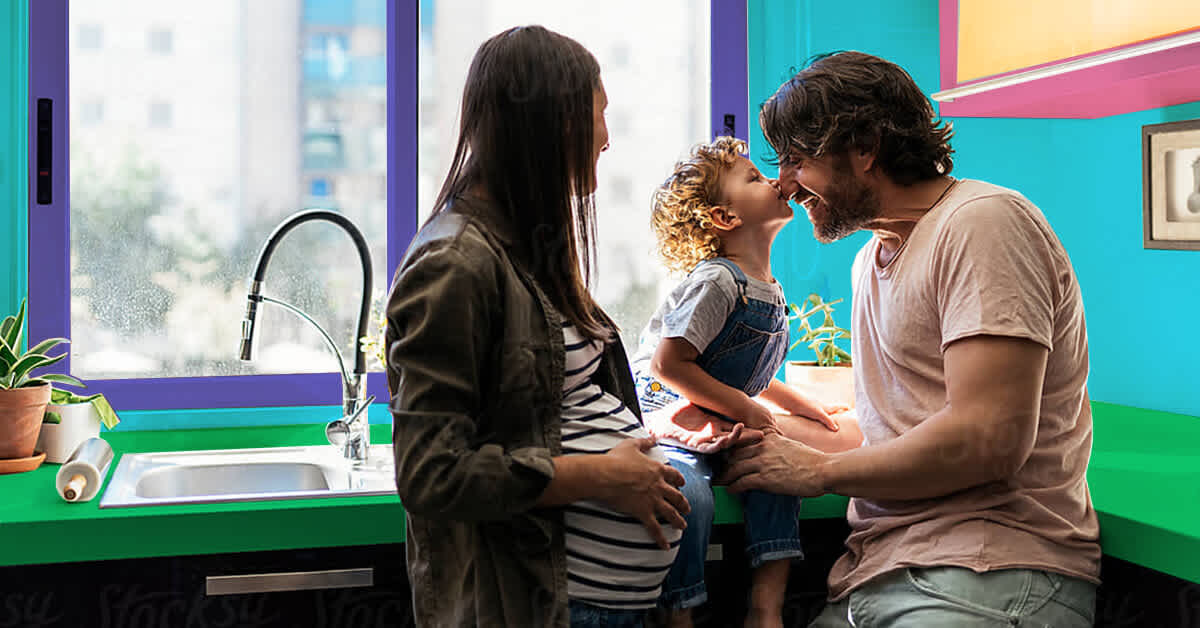Work, Life, Balanced
Real Parents Dish: ‘Should We Really Have More Kids?’
By Jessica Sillers — Nov 6, 2018

I’ve learned more about family planning in the last two years than the rest of my life before that.
As months ticked on and doctors performed test after test without finding a clear cause for our fertility troubles, my husband and I realized having kids doesn’t always happen via a simple “yes or no” decision. In our case, we’re lucky to be expecting again, but the experience prompted me to think more deeply about how families form.
Having a biological child can be more complicated than it seems. About 1 in 8 women in the United States have trouble getting or staying pregnant, like I did. And even a viable pregnancy can be grueling and dangerous for mother and baby (morning sickness, anyone?).
Plus, let’s face it: Kids cost money.
A positive pregnancy test means at least 18 years of food, clothing, housing and more. And that’s not even counting college costs! Life has a tendency to send unexpected changes our way.
These real parents opened up about the choices and challenges they’ve faced when thinking about having, or not having, more kids.
“I can’t put myself through a third pregnancy.”
I always used to think I wanted as least three , maybe four. I had my first son, which was beautiful and easy and perfect. I wanted more. Then I had a miscarriage, and for two years, I refused to even consider getting pregnant again.
I eventually reconsidered, then had miscarriage number two. I got pregnant again (and stayed that way) when my oldest was 4, so my two living children are about five years apart in age.
However, my last pregnancy was extremely high risk. I had tons of extra tests and monitoring. Baby had three blood transfusions while still in the womb, and he spent a week and a half in the NICU after birth.
There’s no way I can put myself (or my kids and husband) through all that again. So we’re done. Sometimes I feel deep regret when I think about the fact that I’ll never give birth again, never have another newborn of my own. But for me, the risks—both physical and emotional—of another pregnancy majorly outweigh any benefits.
—Alison*, age 33, Fairfax, Virginia
“I want a baby, but we just can’t afford it.”
I have two boys, ages 4 and 1 and a half. We would definitely try for a third child if we had more support, like money or family nearby. I’m a writer, and my husband’s a welder. We pull in a working class paycheck and we live in an expensive city.
Having both kids in daycare was comparable to what I made in a year. I honestly want three, but we just can’t afford it. We don’t have enough capital for me not to work, or to pay for a big enough apartment, or pay for all of the things that come with children.
The fact that I can’t really work as much has played a huge part in . If someone handed us a house and $300,000, I’d be like, “Maybe we could do it.”
I’m going to regret not having a third child. I’ve given away the baby clothes I was saving, even my favorite things. Not holding onto the idea of another child helps a lot with accepting that we’re not going to go for #3.
—Danielle*, age 37, Denver, CO
“I found myself caring for a newborn while caring for my stepsons.”
I didn’t have any kids in mind until I met my partner four years ago. I was 32 and blissfully independent and childfree. He had two children from a prior relationship. Custody logistics led us to care for the boys close to full-time.
Meanwhile, we decided we wanted a biological child together.
l found myself caring for a newborn while still doing the bulk of the caring for my two stepsons. It was an incredibly challenging, and at times, dark period for me. If I could go back in time, I would have told myself to focus on my baby and let others take on the caring load for my stepsons. I'd also tell myself look after myself more.
We're now back to 50/50 custody with my stepsons, and I've had lots of discussions with my partner about how hard this experience has been for me and how I simply can't continue shouldering the bulk of the caring load for the older boys. He understands, and we now have a good relationship with their mum, which helps.
We’re planning to have a second biological child, in part to give our son a “full-time” sibling. I'm certain I would not regret having another, and worried I’d regret it if I don’t.
—Lori*, age 36, Melbourne, Australia
“It’s hard knowing how to prepare for a baby, but we had six!”
We always wanted a large family. Both of us being raised in large, religious, conservative families influenced this inclination. We both now see the pressure to have so many kids as manipulative.
I was raised Mormon, and there is intense pressure to get married, and the idea that women were made by God specifically to be mothers. That wasn’t what was best for my family and me, but I didn’t question it. The standard of “large families are best” for me felt manipulative when I left the church. I’m pretty agnostic now.
I have six kids and we love them, but would never, ever recommend it. While not wishing away any of our kids, we somewhat regret our choices.
As it turns out, four of my six have learning disabilities or other special needs. It is extremely expensive and difficult to advocate for them and help them. At one point, we had ten therapy appointments a week.
The kids have had to learn patience and resilience. There is a lot of unfairness that I am guessing will come up in therapy when they are older; we’d love to bond more with the kids on an individual basis. Months will go by and we’ll have to reassess who might be getting lost in the shuffle. Some kids are squeakier wheels. So we are a close family, and we keep it as positive as we can. But it’s hard.
—Hannah*, age 38, Boston, MA
“I wanted a baby, but my husband didn’t agree.”
I always wanted at least two kids. Around the time my daughter was 3 and a half, I had this indescribable urge. A biological clock or whatever, it just hit me. My husband was reluctant and I wasn’t going to take no for an answer, so I suggested we have a therapy session or two about it.
So we went and met with my therapist and talked about it, and it was a very philosophical conversation, not very emotional, just putting the pros and cons out there. He kept saying, “I want to survey the rocks before I jump,” and I was saying, “I just want to jump!” And I won.
My husband was pretty sold after the session, and we started trying soon after.
We did a survey of friends and family, asking what’s it like with more than one. We’d get the standard response of, “It’s twice the work but twice the joy.” That answer didn’t really do it for us, but now I totally get it.
—Kate Rope, age 45, Atlanta, GA
“These little lives depend on me now.”
After a family emergency suddenly gave us three new kids to raise (a grade-schooler, a preschooler and a toddler), we had barely a week to decide we were on board, to prep bedrooms and shop for three children, to clean everything in sight and prepare to be inspected. It’s emotional whiplash.
You don’t have time to think beyond your list of everything that needs to get done immediately. Suddenly getting thrown into that role was an adjustment for me. I felt somewhat rebellious and irritated about the change in lifestyle and activity level for awhile. We used to be able to drop everything and dash out of town if we felt like it. Now a grocery run sans small children feels like a naughty level of freedom.
It all hits you later: “I’m a MOM. These little lives depend on me now.” You have no choice but to push through, and your preferred number of daydream babies is no longer important.
We had been married for several years and had been trying for a baby. When the kids arrived, all of that went on the back burner. Our baby was a surprise; we’d basically given up on that and were actively focused on our older children.
I think both of us would have thought long and hard before having this many kids if we had been given the chance to do it one at a time. But now it feels like most of the things people stress over when it comes to family size aren’t that big a deal.
—Melody*, age 34, Montana
*Name changed for privacy.
Fabric exists to help young families master their money. Our articles abide by strict editorial standards.
Information provided is general and educational in nature, is not financial advice, and all products or services discussed may not be offered by Fabric by Gerber Life (“the Company”). The information is not intended to be, and should not be construed as, legal or tax advice. The Company does not provide legal or tax advice. Consult an attorney or tax advisor regarding your specific legal or tax situation. Laws of a specific state or laws relevant to a particular situation may affect the applicability, accuracy, or completeness of this information. Federal and state laws and regulations are complex and are subject to change. The Company makes no warranties with regard to the information or results obtained by its use. The Company disclaims any liability arising out of your use of, or reliance on, the information. The views and opinions of third-party content providers are solely those of the author and not Fabric by Gerber Life.

Written by
Jessica Sillers
Related Posts
Work, Life, Balanced
CFPs, Money Coaches and More: Which Financial Professional Is Right for You?
A financial professional can help you manage your money. What type of financial pro you need can depend on the kind of help you’re looking for.
By Jessica Sillers
Work, Life, Balanced
What Parents Need to Know About Taxes in 2025
Tax credits or deductions can help families lower taxes and keep more money to enjoy with your kids.
By Jessica Sillers
Work, Life, Balanced
Does Your Partner Lie About Money? Ways to Find—and Fix—Financial Infidelity
Financial infidelity, or being dishonest about money with your partner, can affect your finances and relationship. Spot unhealthy patterns and learn ways to build money habits that strengthen your bond.
By Jessica Sillers
Fabric Picks
Life insurance
Places to Get Emergency Cash, Ranked From Best to Worst
When money’s tight, you need funds quickly. These ranked options can help you find your best source of emergency cash without hurting your financial future.
By Jessica Sillers
Life insurance
How to Juggle Long-Term Financial Goals When You’re in the Thick of Parenting
It can be hard to save when current expenses take priority. Tips to save for retirement and manage a family budget.
By Jessica Sillers
Saving/Investing for Kids
How to Do 30 Days of Financial Self-Care as a Parent
Self-care comes in many forms, including how you handle your money. See how small steps may add up to help improve your financial well-being.